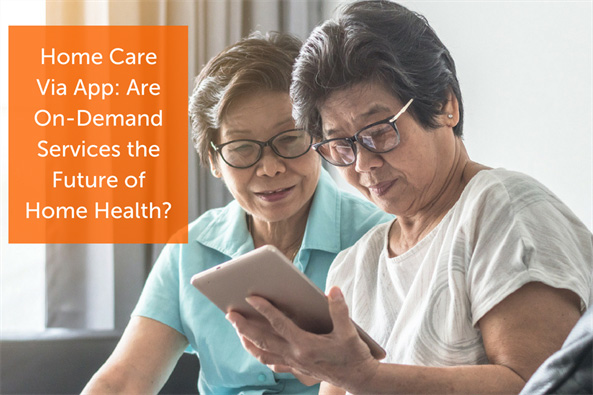We live in an on-demand world today. Want to watch last night’s primetime TV or a new release film? Just call it up on any number of digital services. Need a ride somewhere? Use an app like Uber or Lyft, and you’ll have a car at your doorstep in a few minutes. Don’t have time to shop for groceries? With a few clicks, you can order a week’s worth of food and have it delivered right to your door – no need to even get dressed.
It only makes sense, then, that the world of on-demand services is creeping into healthcare. We’ve already seen it via apps that offer access to trained mental health professionals for one-on-one counseling, and through services like Doctor on Demand, which allows users to consult with a physician via webcam for minor illnesses. However, the world on on-demand healthcare is expanding even more, and is creeping into the world of home health.
Care When and Where It’s Needed
As many of the millions of family caregivers in America can attest, it’s not always easy to make sure that elderly loved ones have the care they need. For many of these caregivers, who have full time jobs and other family responsibilities, it’s simply not practical to be with an elderly parent or other relative 24-7. And given the very specific requirements for home health care under Medicare and most insurance plans, many older adults don’t actually qualify for traditional home health services. This leaves many people with a conundrum: Either attempt to manage their loved one’s needs on their own, which can lead to gaps in care, or pay out of pocket for home care services, which may not always be available or meet a patient’s specific needs.
That’s where on-demand home care comes in. Several companies, including California-based Honor and East Coast-based Hometeam, are providing home services via app. When a client needs help, for example, with making lunch, going for a walk outside, or running errands, he or she can request a caregiver at a specific time for those specific activities, much like one would order a meal using a delivery service. Clients pay for services on an hourly basis based on their request, with no need for a contract or ongoing schedule.
Honor and Hometeam, as well as other home care apps, ensure the safety of the patients and their families by hiring only certified home health aides, CNAs, home health nurses, or people with verified caregiving experience. In many cases, the caregivers working for these services, which often pay more than home health agencies, are nursing students or other home health providers looking to boost their incomes. The companies perform an initial in-person assessment with the client, during which specific preferences and information is noted. For example, a caregiver who is allergic to dogs will not be sent to a home with pets.Once established, clients can request care whenever they need it.
Pros and Cons of On-Demand Care
Many family caregivers see the ability to request home care when it’s needed as a godsend. Not only does it give them a bit of freedom and peace of mind that their loved one is being cared for, it’s less expensive than paying for a full-time aide, or even for help a few times per week. And from the provider’s perspective, working with one of these on-demand services offers many benefits. Not only can providers make their own schedule and work when it is convenient for them, in many cases the hourly pay rate is higher than average.
However, there are some drawbacks to these services, and some healthcare experts are concerned about the effect that care on demand could have on the home health industry as a whole. For starters, app-based on-demand care is typically limited to assistance type care; i.e., bathing, feeding, medication management, and general assistance with daily tasks. It is not skilled nursing care, and it’s possible that patients may not receive the full care that they need from these services. Home health care agencies use advanced home healthcare software to manage patient care and work closely with doctors and other medical providers to ensure better outcomes, where an on-demand provider’s primary task is to provide assistance. That’s not to say that there isn’t room for both, but an on-demand provider isn’t the best option for all people.
There is also the question of paying for these services. Currently, they are not covered by Medicare or private insurance, meaning clients and their families must pay out of pocket. Because they aren’t bound to the same standards and conditions as Medicare providers, patients need to understand what services will entail and do their homework to ensure quality care. Still, the flexibility that these services provide make them a promising option for meeting the demand for home health services in the future, and the ultimate effect on the industry as a whole remains to be seen.
To learn more about tools that can help your agency remain competitive in the fast-changing world of home healthcare, click here to check out some of Complia Health’s resources.




